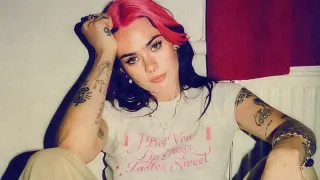
3 hours ago
Simon Haines Is Running the Bi Revolution—And He Wants You in the Race
READ TIME: 16 MIN.
If you’ve felt a seismic shift in the force of queer representation lately, you’re not alone. Enter Simon Haines: actor, playwright, and very much the bisexual leading man the world has been waiting for. Hot off his role in Edgar Wright’s futuristic thriller "The Running Man", Haines isn’t just running for his life on screen—he’s running headlong into the fray for bi visibility and nuanced queer storytelling, and he’s inviting the entire LGBTQ+ community to join him for the sprint .
Haines’ journey reads like a queer fever dream: growing up in Somerset, watching "Hot Fuzz" as a kid (and finding it “way too gory”) before landing a role in Wright’s latest dystopian blockbuster . In "The Running Man", itself a reimagining of Stephen King’s cult classic, Haines stars alongside Glen Powell and a constellation of queer talent including Lee Pace, Katy O’Brian, and the indomitable Colman Domingo .
For Haines, collaborating with fellow out actors—“icon” Colman Domingo, especially—was “a total joy,” even if their scenes didn’t overlap. “You can tell ’s a real leading man in terms of the way he conducts himself with the cast and crew,” Haines enthused, radiating the kind of team spirit that’s all too rare in blockbuster filmmaking .
But what sets Haines apart isn’t just his screen presence—it’s the unapologetic way he claims his bisexuality in an industry still catching up to the full spectrum of queer lives. “I am trying to be the change I want to see in the world,” he tells PinkNews, echoing that old activist wisdom but making it sound utterly new .
Growing up with little visible bi representation, Haines understands all too well the loneliness of feeling unseen. Today, he can point to Nick Nelson in "Heartstopper" (and Kit Connor, the actor behind him), Alan Cumming, "The Wheel of Time*"s Maksim, Patrick Zweig in "Challengers", and Almut in "We Live in Time" as rare but meaningful examples. But he’s hungry for more—especially for characters who explicitly say the “B” word on screen .
“I was gobsmacked,” Haines recalls, describing the thrill of hearing Ethan Hawke’s Lorenz Hart in "Blue Moon" plainly state, “I like both.” For Haines, such moments are seismic: “There is a power in such a heteronormative world for somebody to explicitly say, ‘I am this and this is different’, because people still don’t have those role models” .
But Haines is also quick to critique the pitfalls: too often, bisexual characters are reduced to tired tropes—messy love lives, infidelity, or the perennial closet drama. “It’s so boring and it’s harmful if that’s all people are seeing,” he says, calling out recent films that trade on bi stereotypes instead of expanding the narrative .
Haines’s activism isn’t confined to his day job. He’s already at work on a new play, “loosely inspired” by Tennessee Williams’ "Cat on a Hot Tin Roof", but with a twist for the TikTok generation—a closeted bisexual footballer negotiating love and secrecy in contemporary Britain. Haines is keen to reclaim the narrative around literary figures like Brick, long interpreted as closeted gay men, and to challenge the “bi-erasure” lurking in those readings. “When he talks about his relationship with Maggie, he’s very positive about it up until the point where she cheats on him with his best friend. So, it’s bi-erasure of people to be like, ‘he must be gay’” .
This new work is a direct challenge to the idea that bi people must be defined by conflict, secrecy, or heartbreak—a call for stories where sexuality isn’t the main point of tension but merely one facet of a fully realized identity. “We’ve begun to see more of that in recent years,” Haines notes, citing "Riot Women" and "We Live in Time" as standouts .
Long before he graced the screens of "The Lord of the Rings: The Rings of Power" or the West End’s "The Mousetrap", Haines was already, in his words, “drawn to roles that complicate the narrative” . His trajectory from Cambridge-educated actor (yes, those Cambridge comedy nights were real) to queer visibility champion is a testament to how much—and how little—has changed for bi talent in the UK .
Yet, for all his growing acclaim, Haines remains laser-focused on the work ahead. With "The Running Man" now hitting cinemas and his play aiming for a 2026 debut, he’s intent on steering queer storytelling away from old clichés and into a future where sexual fluidity is seen, celebrated, and—most importantly—understood.
It can be easy to dismiss the impact of one actor’s visibility, but for those who’ve never seen their experience reflected back, Haines’s presence is a lifeline. He’s part of a new wave of UK queer talent—alongside Lee Pace, Katy O’Brian, and Colman Domingo—that’s refusing to be boxed in, on or off the red carpet .
If pop culture is a battlefield, Haines is proof that a little bisexual visibility can be a revolutionary act. As he puts it: “I am trying to be the change I want to see in the world.” For anyone who’s ever felt erased, sidelined, or forced to choose between binaries, Haines’s message is clear—there’s room on this stage for every letter of the rainbow.






